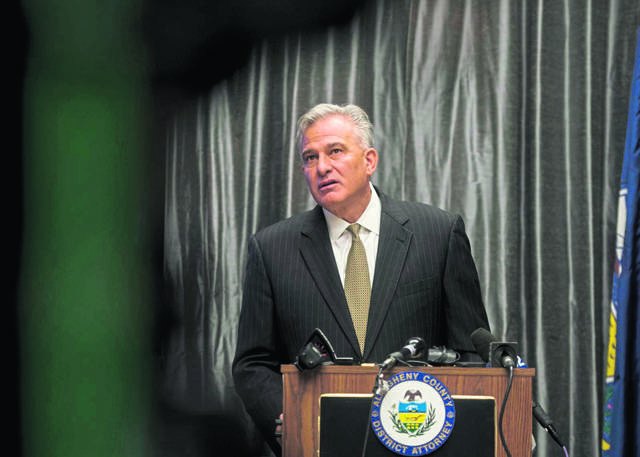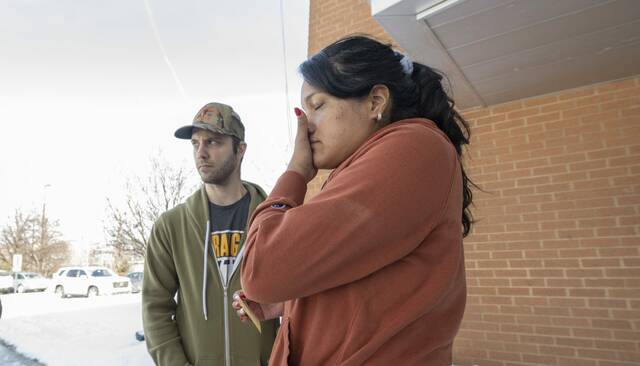A leading expert in the field of prosecutorial ethics said that if Allegheny County District Attorney Stephen A. Zappala Jr. were to apologize for his actions in prohibiting plea deals to a Black lawyer who criticized his office, it is likely that any potential disciplinary action taken against him would be lessened.
Bruce Green, a law professor at Fordham University who runs its Louis Stein Center for Law and Ethics, said on Thursday that with an apology, “At worst, maybe it’s a public reprimand.
“Nobody would think it’s a disbarrable or suspendable offense.”
Zappala does not appear to be apologetic. On Thursday, he issued a statement that he issued the May 18 email banning plea offers to attorney Milton Raiford “to ensure that this office makes consistent, evidence-based decisions, and avoids false claims of racism.”
Citing portions of the May 13 transcript in which Raiford criticized the prosecutor’s office, Zappala said in his statement that Raiford accused his office of being “systematically racist,” making different plea offers based on skin color, and “doubling down” on plea agreements.
He also said that Raiford misrepresented a plea offer and the details of a marijuana case that also included weapons charges.
“Further, the attorney stated that ‘the system needs to be undermined,’ and that he is ‘not going for these crazy plea agreements,’” Zappala said.
His May 18 email said that prosecutors should not to make plea offers to Raiford and should write down and keep notes of their discussions with him. In his Thursday statement, Zappala said that he took the actions because he “took seriously that attorney’s stated desire not to accept plea offers, and directed my deputy district attorneys to memorialize any plea discussions with this attorney and not to offer pleas to that attorney without approval from the front office.”
Since the Tribune-Review first reported the email, there has been mounting public pressure from politicians, criminal justice advocates and bar groups calling for, at a minimum, an investigation into Zappala’s actions, and at most, his resignation.
On Thursday, the Pittsburgh Black Lawyers Alliance joined in the call for an investigation, as did Pittsburgh Mayor Bill Peduto.
“I think there’s a legal process that needs to be followed. You simply can’t force someone out of office based on allegations even if there’s a paper trail behind it,” Peduto said.
He called on the state attorney general and Pennsylvania Supreme Court to investigate.
Attorney General Josh Shapiro said in a statement Thursday, “You shouldn’t be treated differently in our justice system based on who you are or who represents you in court. What has been publicly reported here is concerning; questions of professional conduct and ethical behavior are the responsibility of Pennsylvania’s Disciplinary Board.”
In Pennsylvania, the Office of Disciplinary Counsel is the body responsible for investigating allegations of attorney misconduct.
Its chief counsel, Thomas J. Farrell, said he could not comment on the Zappala issue.
However, in March, Farrell authored an article in a publication for the Pennsylvania Association of Criminal Defense Lawyers in which he talked about the need for more disciplinary enforcement against the state’s prosecutors.
“Prosecutors are the most powerful actors in the most visible part of of our legal system, the criminal justice system,” Farrell wrote. “Misconduct by prosecutors poses a serious threat to the integrity of our legal system.”
He went on to say that in his experience, most prosecutors are of the “highest integrity who take seriously their mission to protect the public and ensure a process that convicts the guilty, protects the innocent and yields accurate results.”
Still, to ensure justice, he wrote that his office has changed its internal policies “to become more effective in investigating and prosecuting misconduct by criminal prosecutors.”
In Pennsylvania, the Office of Disciplinary Counsel can initiate an investigation into an attorney in several different ways.
An individual can file a complaint — whether that person is a party to a case, a client, a fellow attorney or even a citizen who observes or is aware of alleged misconduct — such as by reading news articles, court opinions or transcripts of proceedings.
Or the office can initiate an investigation on its own when it becomes aware of questionable conduct.
The office has subpoena power to obtain documents, but it does not have the power to depose witnesses during its investigation. Investigators can seek to interview people, but they are not under oath and can decline to participate.
The process can take several months, and can conclude without any information being released to the public. However, even if discipline is handled privately, the office provides the original complainant with the outcome of the case.
Peduto said he was not surprised at Zappala’s actions.
“My opinion is that is an abuse of office. It is a personal attack against one individual, and having been on the side of the DA’s attacks over the past eight years, I know what it’s like,” he said. “This is the way of doing business with the DA’s office in Allegheny County.”
State Rep. Ed Gainey, who defeated Peduto last month in the Democratic mayoral primary election, said the Zappala’s actions were a “disappointing step backward.”
“I call on the district attorney to reverse course on this reckless decision, apologize, and open his office to any investigation into this matter to preserve public confidence in the conduct of the office,” Gainey said in a statement late Thursday.
Kelvin Morris, a criminal defense attorney and member of the Pittsburgh Black Lawyers Alliance, wonders how many other orders Zappala has issued to his prosecutors.
“I think it’s bigger than this,” Morris said. “How deep does this really go — the number of people that could be impacted by this?”
On Thursday, the alliance issued a statement demanding an investigation, saying that Zappala’s actions were designed to target, penalize and humiliate Raiford for addressing systemic racism in the DA’s office.
“Zappala’s use of his position and power to deny due process to Raiford’s clients perpetuates the systemic inequality and racism that Raiford called to eradicate and demonstrates that under Zappala’s watch, people get the process that Zappala believes they are due, and not the due process required and guaranteed by our Constitution,” they said.
Those actions, the alliance wrote, violate Zappala’s oath as both a lawyer and district attorney, “and render him unfit to serve as an elected official or as a member of the Pennsylvania Bar.”
Green said the actions ordered by Zappala in his email cannot be justified, and that his Thursday statement does not change that.
“The publicly announced policy is still unethical. The clear implication is that, when it comes to plea offers, the DA’s office will treat Milton Raiford’s clients differently from other similarly situated clients, and obviously less favorably, based solely on the identity of their lawyer,” Green said. “Further, the press release makes clear that the DA adopted this policy in response to critical statements that Raiford made in an earlier case.”
If Zappala thinks Raiford’s comments were inappropriate, that concern should have been raised with the court, Green said. Plea bargaining should be based on the conduct of the accused, “not made in retaliation for criticisms or even false statements of the accused’s lawyer in an unrelated case.
“The DA’s office is putting criminal defendants in the county on notice that they take a risk if they retain Raiford, and that they may be in trouble if the court appoints Raiford to represent them,” Green said. “That will drive some clients away and undermine others’ trust in their lawyer. Prosecutors are supposed to ‘seek justice.’ This isn’t it.”








